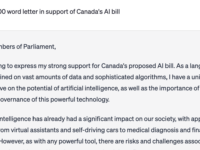ChatGPT has taken the world by storm in recent months with the potential of generative AI – both positive and negative – top of mind in just about every sector. That is certainly true for the legal profession, where AI tools are becoming increasingly common and courts and regulators try to grapple with the implications. Amy Salyzyn is a colleague at the University of Ottawa who has written extensively in the area of legal ethics, lawyer regulation, the use of technology in the delivery of legal services and access to justice. In the coming academic year she’ll be teaching a course on AI and the legal profession and she joins me on the Law Bytes podcast to talk about the latest on AI technology for law and the legal, regulatory and ethical challenges it brings.
Post Tagged with: "artificial intelligence"
Why the Government Should Hit the Regenerate Button on its AI Bill
As anyone who has tried ChatGPT will know, at the bottom of each response is an option to ask the AI system to “regenerate response”. Despite increasing pressure on the government to move ahead with Bill C-27’s Artificial Intelligence and Data Act (AIDA), the right response would be to hit the regenerate button and start over. AIDA may be well-meaning and the issue of AI regulation critically important, but the bill is limited in principles and severely lacking in detail, leaving virtually all of the heavy lifting to a regulation-making process that will take years to unfold. While no one should doubt the importance of AI regulation, Canadians deserve better than virtue signalling on the issue with a bill that never received a full public consultation.
The Law Bytes Podcast, Episode 163: Cohere AI CEO Aidan Gomez on the Emerging Legal and Regulatory Challenges for Artificial Intelligence
ChatGPT burst onto the public scene late last year, giving artificial intelligence its “aha moment” for many people. AI is now seemingly everywhere, attracting enormous attention and excitement alongside concerns, legal threats and talk of regulation. The potential of AI is evident to just about everyone, but the challenges associated with bias, copyright, privacy, misinformation and more can’t be ignored. Cohere AI is a Canadian-based AI firm that is widely viewed as one of Canada’s AI stars for its large language models that enable companies of all sizes to integrate AI technologies. Aidan Gomez, who worked on the “T” in ChatGPT, is the co-founder and CEO of Cohere AI. He joins the Law Bytes podcast to talk about AI and his views on the myriad of emerging legal and regulatory issues.
The Law Bytes Podcast, Episode 148: Christelle Tessono on Bringing a Human Rights Lens to AI Regulation in Bill C-27
Bill C-27, the government’s privacy and artificial intelligence bill is slowly making its way through the Parliamentary process. One of the emerging issues has been the mounting opposition to the AI portion of the bill, including a recent NDP motion to divide the bill for voting purposes, separating the privacy and AI portions. In fact, several studies have been released which place the spotlight on the concerns with the government’s plan for AI regulation, which is widely viewed as vague and ineffective. Christelle Tessono is a tech policy researcher based at Princeton University’s Center for Information Technology Policy (CITP). She was one of several authors of a joint report on the AI bill which brought together researchers from the Cybersecure Policy Exchange at Toronto Metropolitan University, McGill University’s Centre for Media, Technology and Democracy, and the Center for Information Technology Policy at Princeton University. Christelle joins the Law Bytes podcast to talk about the report and what she thinks needs to change in Bill C-27.











